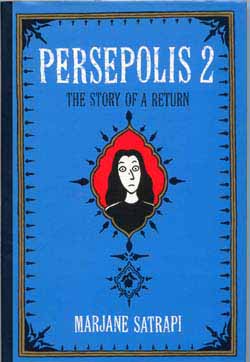 Â
Â
By Marjane Satrapi (Jonathan Cape)
ISBN: 0-224-07440-7
In the sequel to Persepolis – the primitivist reminiscences of a girl whose childhood spanned the fall of the Shah and the rise of the Fundamentalist theocracy in Iran – Marjane Satrapi continues her life-story, but concentrates more fully on the little girl growing into a woman. This idiosyncratic maturation unfortunately acts to somewhat diminish the power of simple, unvarnished observation that was such a devastating lens into the political iniquities that shaped her life, but does make the narrator/illustrator into a fully concrete person, as many of her experiences more closely mirror those of an audience that hasn’t grown up under a cloud of physical, political, spiritual and sexual oppression.
The story recommences in 1984 where the fifteen year old Marjane is sent to Vienna to (ostensibly) pursue an education. In distressingly short order the all-but-asylum-seeker is rapidly bounced from home to home. She is billeted with Nuns, distanced acquaintances of her family, a bed-sit in the house of an apparent madwoman and eventually is reduced to living on the streets, in a catastrophic spiral of decline before returning to Iran in 1988.
Her observations on the admittedly outré counter-culture European students, and her own actions as she grows to full womanhood would indicate that even the most excessive and extreme past experience can still offer a dangerously seductive nostalgia when faced with the bizarre concept of too much freedom too soon. When she returns to her homeland her adult life under the regime of the Ayatollah is still a surprisingly less-than-total condemnation than we westerners, with our agenda-slanted news media, would probably expect. The book concludes with her decision to move permanently to Europe in 1994.
The burgeoning field of autobiographical graphic novels is a valuable outreach resource for an industry desperately seeking to entice new audiences to convert to our product. As long as subject matter doesn’t overpower content and style, and we can offer examples such as Persepolis to the seekers, we should be making real headway.
© Marjane Satrapi 2004. Translation © 2004 Anjali Singh.
